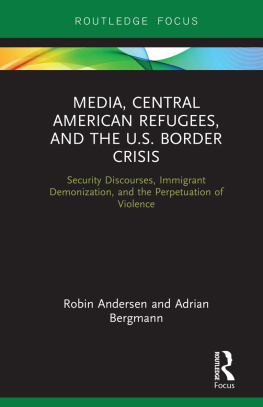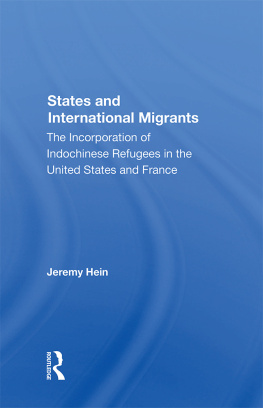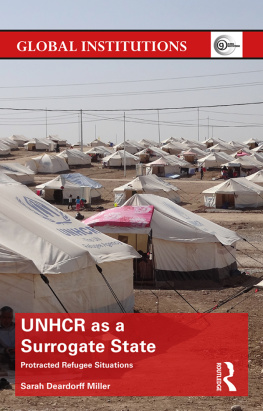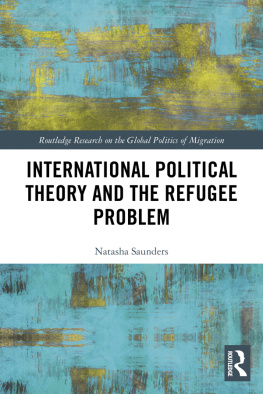
U.S. Media and Migration
Using oral history, ethnography, and close readings of media, Sarah C. Bishop probes the myriad and sometimes conflicting ways refugees interpret and use mediated representations of life in the United States throughout their resettlement. Guided by 74 refugee narrators from Bhutan, Burma, Iraq, and Somalia, U.S. Media and Migration explores answers to questions such as: What does one learn from media about an unfamiliar place? How does media help or hinder refugees sense of belonging after relocation? Why and how does the U.S. government use media to shape refugees understanding of American norms, standards, and ideals? With insights from refugees and resettlement administrators throughout, Bishop provides a compelling and layered analysis of the interaction between refugees and U.S. media before, during, and long after resettlement.
Sarah C. Bishop is an Assistant Professor in the Department of Communication Studies at Baruch College, City University of New York.
U.S. Media and Migration
Refugee Oral Histories
Sarah C. Bishop
First published 2016
by Routledge
711 Third Avenue, New York, NY 10017
and by Routledge
2 Park Square, Milton Park, Abingdon, Oxon OX14 4RN
Routledge is an imprint of the Taylor & Francis Group, an informa business
2016 Taylor & Francis
The right of Sarah C. Bishop to be identified as author of this work has been asserted by her in accordance with sections 77 and 78 of the Copyright, Designs and Patents Act 1988.
All rights reserved. No part of this book may be reprinted or reproduced or utilised in any form or by any electronic, mechanical, or other means, now known or hereafter invented, including photocopying and recording, or in any information storage or retrieval system, without permission in writing from the publishers.
Trademark notice: Product or corporate names may be trademarks or registered trademarks, and are used only for identification and explanation without intent to infringe.
Library of Congress Cataloging-in-Publication Data
Bishop, Sarah C., 1984 author.
U.S. media and migration : refugee oral histories / Sarah C. Bishop.
pages cm
Includes bibliographical references and index.
1.Mass media and immigrantsUnited States.2.RefugeesUnited States.I.Title.
P94.5.I482U6545 2016
302.23086'9120973dc23
2015029561
ISBN: 978-1-138-94746-7 (hbk)
ISBN: 978-1-138-94747-4 (pbk)
ISBN: 978-1-315-67007-2 (ebk)
Typeset in Bembo
by Apex CoVantage, LLC
Contents
This project was made possible through an oral history grant from the Arthur and Elizabeth Schlesinger Library on the History of Women in America at Harvard University, a teaching fellowship from the Department of Communication and the Dietrich School of Arts & Sciences at the University of Pittsburgh, a summer research award from the Dietrich School of Arts & Sciences at the University of Pittsburgh, and a research grant from the Waterhouse Family Institute for the Study of Communication and Society at Villanova University. I have been humbled by the amount of time that the directors and administrators at refugee resettlement agencies in Pennsylvania, New York, Texas, and California have willingly given to facilitating this project and owe a debt of gratitude to Kheir Mugwaneza of Northern Area Ministries in Pittsburgh; Leslie Aizenman of Jewish Family & Childrens Services of Pittsburgh; Dylanna Jackson at the International Institute of Erie; Marc Fallon at CAMBA NYC; Lisa Guitguit, Jeff Klein, Melody Brown, and Ron Rea at YMCA Houston; Meg Goodman Erskine and Esther Diaz at the Multicultural Refugee Coalition Austin; Meghann Perry at Journeys End Refugee Services; Sahra Abdi at United Womens East African Support Team; Said Abiyow at Somali Bantu San Diego; Mike McKay at Catholic Charities; and Lily Alba at the International Institute of Los Angeles. To all of the interpreters, thank you for your patience and attention to detail. To the narrators, thank you for sharing your stories. I am forever grateful. To Jonathan Crane, thank you for driving, listening, editing, and to my advisor at the University of Pittsburgh, Ron Zboray, and to Jonathan Crane, Brent Malin, Olga Kuchinskaya, and Kent Ono, I offer my sincerest thanks; your guidance at each state of this project was invaluable. Finally, special thanks to Mary Zboray for her close attention to my work, infinite patience, and encouragement.
The United States accepts around sixty thousand immigrants with refugee status each year. These forced migrants fled or were driven from their homes because of some social, political, or natural threat to their safety. While some refugees know a good deal about the United States when they arrive, many have moved directly from refugee camps that often lacked access to television, the Internet, and other mass media. When refugees arrive in the United States, they not only confront a new nation about which they may have limited prior knowledge but also a media-saturated environment in which successful orientation and resettlement depends on their ability to engage with such media. Because refugees throughout their relocation process need to interact with U.S.-made films, television, and news, as well as with U.S.-government-produced print matter, to help them navigate their new environment, studying such encounters offers a previously underdeveloped perspective of medias role in refugees lived experiences and, more broadly, of U.S. medias variable capacity to provide crucial information to these individuals.
This book looks into the ways refugees use and interpret multiple forms of U.S. media throughout their long-term relocation. With the aid of firsthand perspectives provided by seventy-four oral history interviews I conducted with refugees in the United States, as well as twelve interviews with refugee resettlement administrators, I work to answer the following questions: How is relocating refugees knowledge about their new host country influenced by their encounters with media from the United States during the relocation process? How does mediated communication help or hinder refugees sense of belonging in the United States? What role, if any, do media play in refugees attempts to adopt or resist perceived American norms, standards, and ideals? Finally, how do media produced by local, state, and federal governments shape refugees understanding and experiences during relocation, and how do governments attempt to use these media toward particular ends? By analyzing refugees encounters with U.S. media before, during, and after their relocation to multiple parts of the United States, this book directly addresses each of these questions.
One cannot gain a thorough view of medias role in refugee resettlement by considering only the media that refugees encounter before they are displaced; likewise, a view that takes into account only the ways that media and refugees interact post-resettlement would prove too narrow to offer insight about the ways that refugees transition from one nation to another with the impact of pre-resettlement media encounters lingering in their deep memory. For this purpose, this book is organized according to the ways medias impact unfolds sequentially through three general stages of migration: (1)








